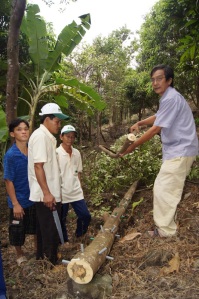General
The primary stakeholders and beneficiaries are farmers in two provinces in Viet Nam, the National University in Ho Chi Minh City, two provincial Science, Technology and Environment institutions, and the Forestry Service of An Giang. In addition, worldwide Agarwood product manufacturers, traders and consumers will be beneficiaries.
Local People
A minimum of 200 farming families who are extremely poor and have incomes well below national averages will be taking part in the project, and will be trained in planting, rearing, and resin inducement techniques. Trees planted and supported by the project will be owned by participating farmers living in and around forests. They are the direct economic beneficiaries of the project.
Producers and Consumers
Processors, exporter and tax authorities will benefit because of the creation of a sustainable source of Agarwood. A steady, legal, certified and quality-controlled source of agarwood will become available, taxes can be levied, and income derived.
Consumers will benefit because a stable amount and range of agarwood products will become available in due course, quality will be assured, and products will remain affordable. A considerable number of participants will also benefit as consumers of resin-impregnated incense, necessary for their religious ceremonies.
Researchers
TRP has cooperated with Professor Robert Blanchette, at the University of Minnesota and his research project over the last 9 years to develop a successful way to induce agarwood in trees. In addition, training of scientists, and one chemist will conduct a two year post-doc in Aquilaria resin chemistry. The primary participating Vietnamese institutions, the Science Technology and Environment Services and the National University of Ho Chi Minh City, will acquire specific technical, laboratory, training and research capabilities in line with their general mission.
Provincial counterparts from the Science, Technology and Environment services and Forestry Service will receive intensive training, including propagation techniques, marketing, and chemical and biological analyses.

